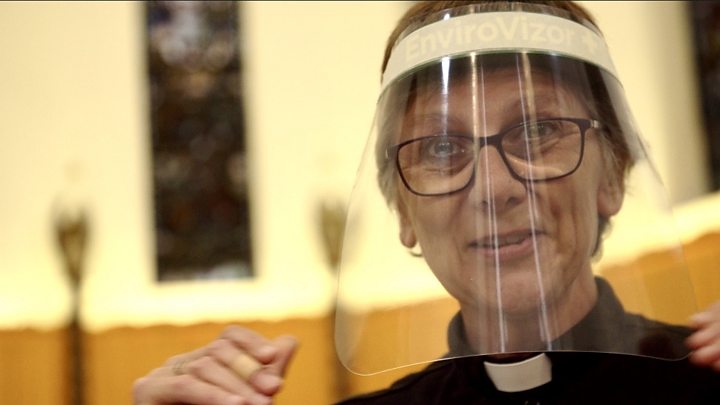
Media playback is unsupported on your device
“I just used to lock myself in my car and cry after every funeral.”
For Canon Jan Gould, of the Church of the Resurrection in Ely, Cardiff, the pandemic has been an intensely emotional and challenging time.
She has ministered about 60 funerals since it began, with a third due to Covid-19 and several suicides.
“Coping with that, with the numbers that we were dealing with, was very, very difficult,” she said.
Parts of Ely are among the poorest 10% of areas in the Welsh Index of Multiple Deprivation.
‘Enormous impact’
And Canon Gould said in the early days of the pandemic there was a “real sense of shock” in the community, with four suicides in the first week.
“Suddenly everything that was familiar had stopped.
“Many people had stopped working, some were on furlough, some just lost their jobs and had nothing coming in at all. There was a huge impact on people’s mental wellbeing, which I think is common in many areas of poor income.
“Funerals went up anyway. But we had quite a few suicides early on, and they were all young men who lost their jobs and couldn’t be furloughed because they hadn’t been in their jobs long enough.
“Normally we’d probably expect four or five suicides a year. So to get four in the first week just spoke volumes really about just what an enormous impact this was having on people’s lives.”
The Samaritans says suicide is very complex and not generally connected to a single factor or event, with a wide range of psychological, social, economic and cultural risk factors interacting to increase an individual’s level of risk.
And there is no evidence to suggest the rise Canon Gould has seen locally has been reflected across the UK.
But the Samaritans said this week that its most recent study found 42% of the 2,000 men they questioned said coronavirus has had a negative impact on their mental health.
“As time has gone on it has got easier for people, and word has started to get out there that the support is there. So hopefully you know people are turning to that support now,” Canon Gould said.
Canon Gould said the church would normally have been full for funerals, with hundreds from Ely attending
Funeral restrictions ‘really difficult’
There have been numerous cruel consequences of the pandemic but for Canon Gould, the limit on the number of mourners at funerals and cremations has been among the toughest to bear in a community so closely knit.
After lockdown began, the numbers of mourners was restricted to five and then 10, although up to 30 people are now able to attend outdoor, graveside funerals in parts of Wales.
“Normally, for funerals of young people we would expect several hundred people to be coming to the service and we were only allowed 10 – and that was really, really difficult,” said the canon.
“It was absolutely horrific, really, to go through that trying to support people through it.
“I had one funeral and the lady who died had 12 children. And we could only have 10 of them at the funeral, because that was the rules. And so that family had to decide which two were not going to go say goodbye to their mother.”
Image copyright
BBC Sport
Canon Jan Gould has been at the Church of the Resurrection in Ely for 14 years
‘Everything was about screens’
Public services in places of worship were cancelled in Wales from the end of March, forcing churches such as Canon Gould’s to embrace online services and even print copies of sermons to be posted through the doors of parishioners.
The amount of time spent on the computer – including meetings with families on Zoom and hosting services from her home via Facebook Live – has affected the minister’s sleep patterns and exacerbated pre-existing issues she has with her memory.
“Everything has been about screens in these last four months and it has been really tough coping with that,” she said.
But after the Church of the Resurrection and others reopened their doors for services last month, Canon Gould said she has been left looking back on lockdown as a time when the light outweighed the dark.
“I think this pandemic has really brought out the best in so many people and we’ve seen such an amazing community spirit here,” she said.
“The things that people have been getting up to, it’s been really wonderful – supporting their neighbours, even neighbours they’ve maybe never spoken to.
“I know for a lot of people it has been a really tough time, a lot of people have lost loved ones. And that’s something that you never get over.
“But I think there have been some really good things, and I think those are the things that give us hope for the future.”
Image copyright
YouTube/Church of the Resurrection
Members of the church sing Hosanna for Pentecost Sunday on their YouTube channel